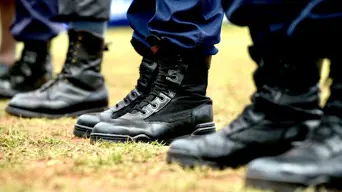SAPS hikes danger pay for elite units in bid to halt exodus to private sector
This follows a recent exodus of members from the Special Task Force and National Intervention Unit who have opted to join private security for better pay.

South African Police Service (SAPS) officers in formation. Picture: X/SAPoliceService
JOHANNESBURG - Police have increased the danger pay for its elite units in a bid to keep them from moving to the private sector.
This follows a recent exodus of members from the Special Task Force and National Intervention Unit who have opted to join private security for better pay.
It costs the taxpayer R1.1 million to train one Special Task Force member and just a little less than that to train a National Intervention Unit member.
In a bid to retain the country’s most elite police members, the South African Police Service (SAPS) has increased the danger pay for members of the Special Task Force and National Intervention Unit to R21,000 from a measly R4,000.
Eyewitness News understands that SAPS management has also promoted all constables and sergeants within the task force and NIU to warrant officers, reverting to how things were done in the past, in terms of rankings.
During a briefing on the successes of Operation Shanela on Monday, Police Minister Bheki Cele said about 58 members of the STF and NIU had left police recently.
"Those that have left have been spoken to, there is a process that they are getting reinstated in the organisation with a much improved conditions and packages."
In March, Eyewitness News reported that besides private security firms, STF and NIU members were being recruited as bodyguards for taxi bosses, cigarette barons and people allegedly involved in the controversial “construction mafia.”